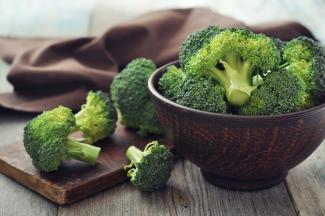
Can I eat cabbage or broccoli? Can I eat miller? Nutritionist Kohila Govindaraju brings you up to speed on ‘goitrogenic foods’ and answers diet questions for persons with hypothyroidism.
What is hypothyroidism:
This is a condition in which the thyroid gland does not produce enough thyroid hormone. The thyroid gland is a small butterfly-shaped gland situated at the base of the front of your neck. Its major function is to produce thyroid hormones, which play many roles in the functioning of the body.
For example, the hormones:
• help maintain normal levels of metabolic activity
• determine how your body uses fats and carbohydrates
• control body temperature
• influence heart rate
• help regulate production of proteins
Untreated hypothyroidism can lead to many problems such as weight gain, heart problems, joint pain and infertility.
Broccoli and bak choy are healthy foods, but they also contain goitrogens.
What are goitrogens:
Goitrogens are naturally-occuring chemicals, found in high quantities in cruciferous vegetables like cabbage, Chinese cabbage, cauliflower, broccoli, brussels sprouts, bak choy, kale, radish, turnip, mustard greens, collard greens.
The thryoid gland uses iodine to make thyroid hormones and goitrogens interfere with an enzyme that is responsible for the uptake of iodine during the formation of thyroid hormones. Goitrogens’ interference with iodine uptake may worsen your hypothyroidism if your thyroid glands are already compromised.
In general, cruciferous vegetables are rich in phytochemicals, vitamins and minerals that lower the risk of cancer. But these vegetables can be detrimental to thyroid function if you are iodine deficient.
Iodine intake and goitre
If your body doesn’t receive enough iodine, the thyroid gland increases in size to try to produce more thyroid hormone, causing goitre. Patients with goitre may experience symptoms of choking, difficulty in swallowing and breathing. Iodine deficiency during pregnancy can cause mental retardation, problems with growth, hearing and speech in children. So, pregnant mothers need to have a good amount of iodine-rich foods in their diet. Dairy products (cheese, milk, yoghurt), seafood, seaweed, soymilk, meat, eggs, bananas, cranberries, strawberries, prunes are good sources of iodine.
Should I stop eating cabbage?
No, you don’t have to give up cruciferous vegetables, just limit their consumption if you have hypothyroidism. Speak to your doctor about moderating your intake of high goitrogenic foods (as mentioned in list above). Some foods such as spinach, peanuts, millet, wheat, sweet potatoes are mild goitrogenic foods that can be enjoyed in small amounts with iodine-rich foods. Edamame (fresh soy bean) and tofu (bean curd) can always be cooked with iodide salt! It is also best not to consume goitrogenic vegetable juice as the goitrogenic chemicals are fully intact in their raw state.
Related Reading: 7 Reasons to munch Broccoli






